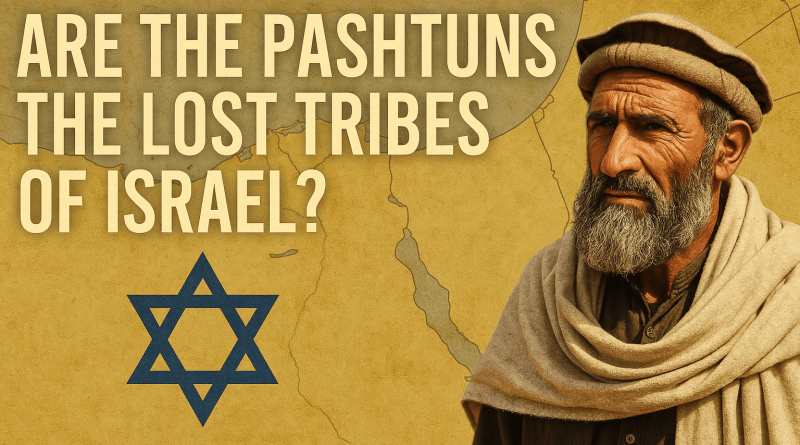Pashtuns and the Israelis: A Forgotten Connection Rekindled
Afghana was exiled from Israel during the Babylonian invasion and later settled in the region that became Afghanistan.
The Pashtuns, also known as Pathans, are an ethnic group primarily residing in Afghanistan and Pakistan, with a rich history and deep-rooted tribal traditions. While widely recognized for their warrior ethos, pride in their tribal code of Pashtunwali, and a legacy of resistance against imperial powers, a fascinating theory has persisted for centuries — that the Pashtuns are the descendants of the Ten Lost Tribes of Israel.
This theory suggests that the Pashtuns trace their ancestry back to the ancient Israelites who were exiled from the Northern Kingdom of Israel by the Assyrian Empire around 722 BCE. According to historical accounts in the Hebrew Bible, these ten tribes were scattered and subsequently disappeared from mainstream Jewish history.
Over the centuries, scholars and explorers have speculated about their fate, with many believing they migrated eastward into Persia and eventually into the mountainous regions of modern-day Afghanistan and Pakistan.
One of the earliest claims supporting the Israelite origin of Pashtuns comes from Malik Faheem Judah of Tiberias, a 17th-century Jewish historian, who claimed that many of the exiled tribes of Israel had settled in the region of Khorasan, which historically included parts of Afghanistan and surrounding areas. This claim was later echoed by colonial-era historians such as Sir Mountstuart Elphinstone, a British administrator in India, who wrote extensively about the customs and traditions of the Afghan tribes.
In his 1815 book An Account of the Kingdom of Caubul, Elphinstone observed that many Pashtun tribes claimed descent from a figure named Afghana, whom they believed to be the grandson of King Saul, the first king of Israel. According to this oral tradition, Afghana was exiled from Israel during the Babylonian invasion and later settled in the region that became Afghanistan.
This lineage story, although unverified by hard evidence, has been preserved among various Pashtun tribes and is taken seriously by many elders. Some tribes claim to be the descendants of Joseph through his son Ephraim, while others claim ancestry from Reuben, Levi, and other tribes.
In fact, tribal names like Yusufzai (interpreted as “sons of Joseph”), Rabbani (possibly from Reuben), and Levani (similar to Levi) are often cited as linguistic evidence supporting the theory.
Similarities Between Pashtuns and Jews
In addition to oral traditions and tribal lore, there are also striking similarities between some Pashtun customs and ancient Jewish practices. Observers have pointed to the Pashtuns’ practice of lighting candles on Friday evenings, circumcision on the eighth day, dietary habits resembling kosher laws, and even the levirate marriage practice — where a man marries his deceased brother’s widow — which is outlined in the Torah. Furthermore, in older times, certain Pashtun garments resembled the Jewish tallit, or prayer shawl, with fringes attached.
The interest in this theory isn’t limited to historical anecdotes. Yitzhak HaLevi Herzog, Israel’s first Chief Rabbi, conducted a study on this subject and concluded that the similarities in customs and traditions warranted serious consideration of the Pashtun-Israelite connection.
In more recent years, some Orthodox rabbis and Israeli anthropologists have revived interest in exploring the Pashtuns’ heritage. This has led to the establishment of dialogue with Pashtun communities, some of whom have expressed a desire to rediscover and reconnect with their supposed Jewish roots.
Genetic studies, however, have been inconclusive. A study published in Frontiers in Genetics in 2017 found no definitive evidence of Israelite DNA among the Pashtun population. Critics of the theory argue that over the course of 2,700 years, genetic signatures may have become diluted due to intermarriage, migration, and religious conversion. Supporters counter that cultural continuity and oral tradition are sometimes more enduring than genetic markers.
Despite the lack of scientific certainty, the theory continues to hold strong cultural significance for many. In 2010, a small group of Pashtuns from Afghanistan and Pakistan visited Israel as part of an interfaith and cultural heritage program. They were welcomed by some Jewish communities eager to explore this possible historical link. Their interactions centered around shared customs, ancestral stories, and a mutual curiosity about a possible common heritage.
Today, with the rise of digital platforms, more Pashtuns are engaging with this theory online, sharing stories passed down through generations, and exploring both Islamic and Judaic connections in their cultural practices. Though the theory remains controversial and debated among scholars, it adds a compelling dimension to the identity of one of the world’s oldest and proudest ethnic groups.
The question of whether the Pashtuns are truly the descendants of the Lost Tribes of Israel may never be definitively answered. Yet the parallels in culture, language, and tradition, as well as a strong oral heritage, continue to intrigue scholars and laypeople alike. Whether rooted in historical fact or centuries-old legend, the story of the Pashtuns as the lost sons of Israel is a narrative that refuses to fade away.
References:
- Elphinstone, Mountstuart. An Account of the Kingdom of Caubul, 1815.
- Herzog, Yitzhak HaLevi. Hebrew Portrayals of the Lost Tribes, 1955.
- The Jewish Encyclopedia, “Afghans and the Lost Tribes”, 1901–1906 Edition.
- N. Nir, The Lost Tribes of Israel: The History of a Myth, 2003.
- “The Pashtuns and the Lost Tribes of Israel,” The Jerusalem Post, July 2010.
- Frontiers in Genetics, 2017 – Genetic Research on Pashtun Origins.



